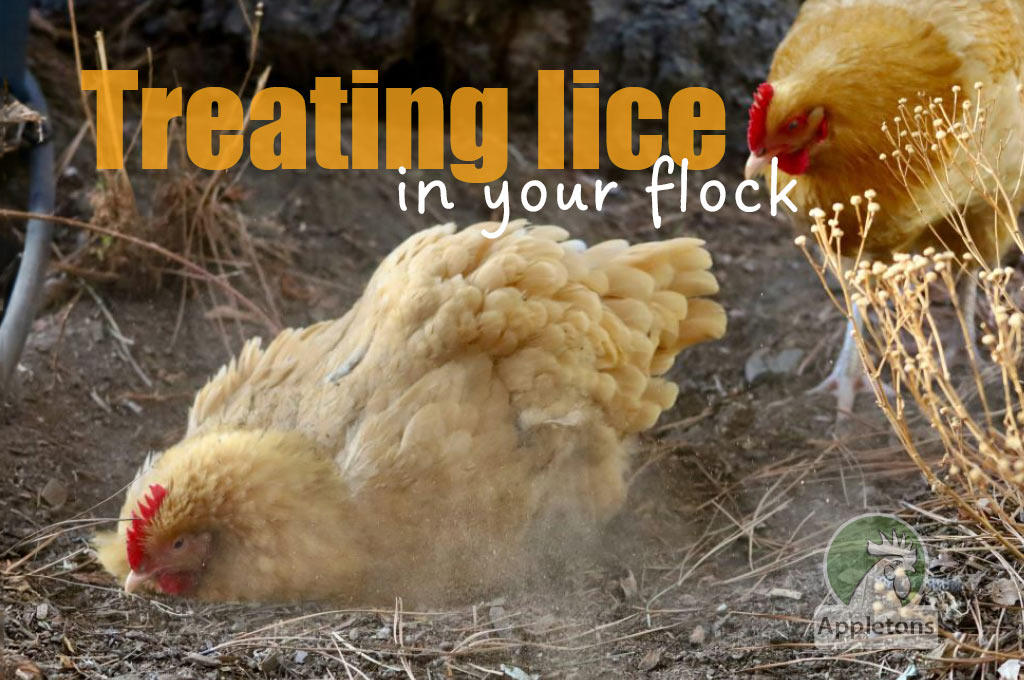Chicken Health | LICE
Do My Chickens Have Lice?
Lice are a fairly common parasite that chickens can suffer from and are passed on by contact with affected birds and wild birds. The most common type of lice that chickens suffer from is Menopon gallinae. Lice will live on the chicken's skin underneath the feathers. The entire life cycle happens on the chicken, so it is much easier to treat lice compared to worms. In small numbers lice don’t cause much irritation to your chickens and your chickens will try to manage their lice by having dust baths which will suffocate lice. However, if your chickens have large numbers of lice living on them, then they will need a bit of extra help from you.
Can Chicken Lice Live on Us?
Poultry lice cannot survive on humans or non-bird domestic pets. This is great news as none of us like these wee crawly critters! A poultry louse generally completes its entire life cycle from egg to adult on a single bird and will die within a few days to a week if separated from a host.
Learn more

Symptoms
- A drop in egg production
- Broken feathers, feather loss, over preening
- Red or sore skin around the vent area
- Scratching
- Can affect bird’s growth
- Lice (about the size of a grain of raw sugar, fast-moving, brown) crawling around the shaft of the feathers.
- Nits - Clumps of eggs stuck to the bottom of the shaft of the feather. Most commonly around the vent area.
This will be a whitish grey and are very hard and tricky to remove.
Prevention
Dust bathing is the best way for your hens to naturally remove lice; and they are pretty good at this! It is a good idea to make designated dust baths for your flock so they can regularly self-monitor lice from being able to take hold. Even better make them a special dust bath bowl using our Appletons Dust Bath Bowl Refills which contain the best ingredients for an effective dust bath. We choose not to include diatomaceous earth in our dust bath formula because it can potentially cause respiratory issues. Chickens raise a lot of dust while taking a dust bath, and it's not ideal for them to inhale it. Assist your chickens in taking care of themselves.
Treatment
Lice are easy to treat and your chicken should be lice-free in a relatively short amount of time from when you start treatment; roughly 3 weeks as the life cycle of the lice is 3 weeks. If there are lots of lice then we recommend you act quickly using a Pour on drench to kill any nasty beasties crawling and feasting on your chicken. Having treated the birds you should also look at their hen house and run. We recommend disinfecting the house thoroughly with a purpose-made poultry disinfectant like Appletons Poultry Safeguard. After treatment use fresh floor litter.
How Do I Treat My Chickens For Lice?

Check your Hens
Pick up your hens and check for lice. Some are tiny while others are large enough to see with the naked eye. Typically, lice have an elongated abdomen. It looks like a grain of rice. A louse will spend its entire life cycle living on an unsuspecting chicken, usually under the feathers, and near the vent.

Pour on Drench
Pour on Drench is considered an off label treatment as not officially approved for poultry. Apply liquid directly to the skin of the bird. Recommended 14 day egg witholding period. Easy to use on poultry as deals to lice, scaly leg mites and anything else living on your hen. Also treats most internal parasites.r the feathers, and near the vent.

Louse Life Cycle
Poultry lice have a life cycle of ~3 weeks and normally feed on feathers or bits of dead skin. Lice may live for several months on the host but remain alive for only ~1 week off the host. An infestation can happen quickly, especially in the warmer months. Check you flock regularly.

Dust Bath Time 😊
Dust bathing is the best way for your hens to naturally remove lice; and they are pretty good at this!
It is a good idea to make designated dust baths for your flock so they can regularly self-monitor lice from being able to take hold.
Shop Dust Bath REFILL
